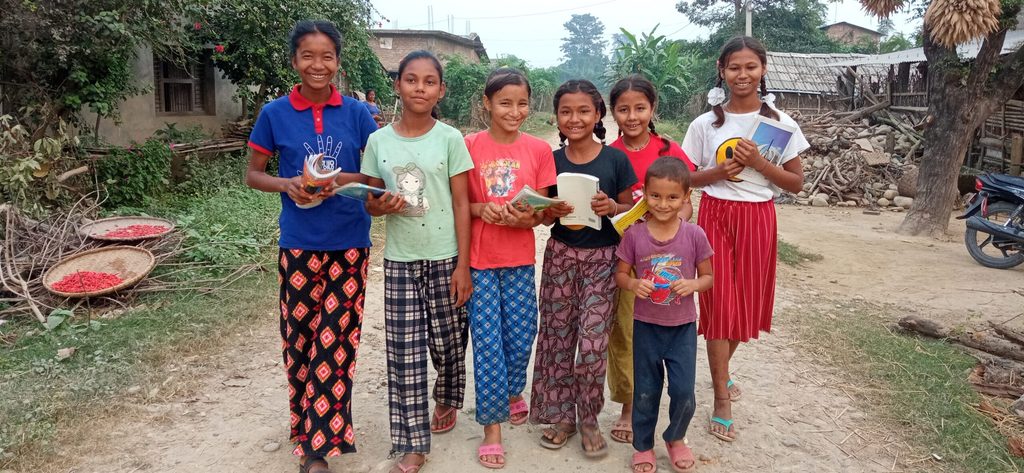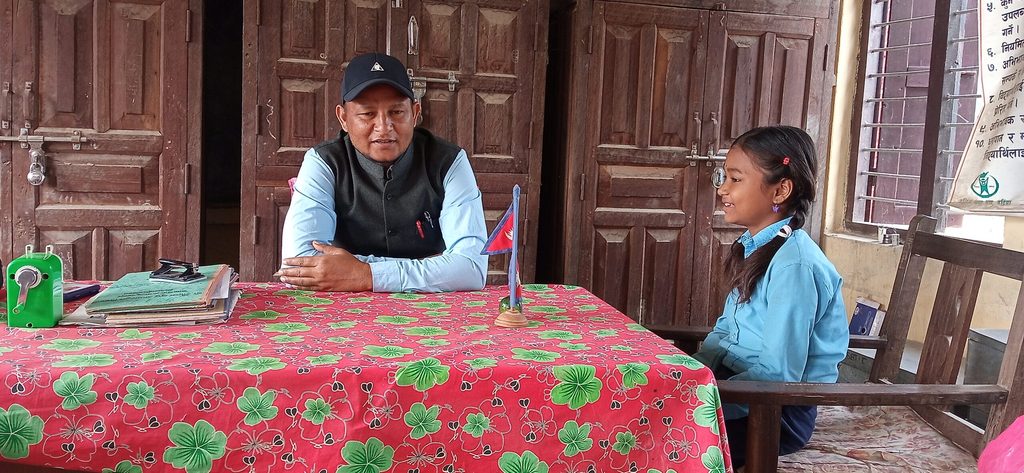Meet the young activist tackling period poverty in Nepal
After learning about sexual health, Anisha, 11, is campaigning for and supporting girls to manage their periods in her school and community.

Anisha, 11, is an active member of the Champions of Change group in her community in Nepal’s Bardiya District. She was just 9 years old when she first started accompanying her sister to the sessions which are held every Saturday.
“Anisha is a curious child and a quick learner. She insisted on becoming a Champions of Change member, but we had to wait until she reached 10 to enrol her,” explains Ramkali, the project supervisor.
Champions of change
Anisha eagerly looks forward to the group meetings on Saturday. She is always ready on time and has encouraged her friends to join the group as well. Together they make their way to the centre where the meetings are held. “It’s been nearly 2 years that Anisha has been a Champions of Change member, she never misses a class,” shares Ramkali.
Anisha is particularly concerned about the discrimination against girls at her school. A caring and supportive girl, if anyone in her class has a problem, she encourages them to go to the teacher straight away so it can be sorted out.
“I raised the issue with the municipality office and told them that due to the unavailability of free pads at school, my friends were skipping their classes.”
Anisha
“One day I saw Anisha shouting at her male friends. She looked furious. I asked her the reason. Her best friend had her first period that day. Due to bleeding, she got it all over her skirt and bench. The boys started to tease her and called her names,” explains Anisha’s teacher.
“Anisha would not tolerate this and started to tell them off. I heard her saying it’s natural, it happens to all girls and even to your mother and sister. When I asked her where she had learned about periods, she told me that she was a member of the Champions of Change group where they are provided with information on sexual and reproductive health and rights.”
Anisha tells us that she has not started her period yet, but because she has 5 close female relatives, she is aware of the changes girls’ bodies go through during puberty. The classes on menstrual health at the Champions of Change meetings have also equipped her with the knowledge she needs in preparation for her first period.
Periods are a taboo topic in Nepal
In Nepal, periods are still considered a taboo issue in many communities. In some parts of the country, girls are even banished to sheds during their time of the month as they are considered impure. A staggering 89% of women and girls throughout the country reported they experience some form of restriction or exclusion during menstruation.
At school one day, Anisha went to the teachers’ room to ask for some sanitary pads for her friend but was told that the school’s supply had run out. “It has been 4 months now since we have had any sanitary pads. I have complained about this to the school management team many times.”
Frustrated by her school’s lack of action, Anisha asked for advice at her next Champions of Change meeting. “Anisha told us about the issue of having no sanitary pads at her school,” explains Ramkali. “She asked me what she could do as the school management team was not taking her request seriously. I suggested that she visit the municipality office and report it.”
The next day, Anisha asked if Ramkali could take her to the municipality office at the town hall so she could make a report about the lack of sanitary pads at her school. Agreeing to accompany her, Anisha met with the head of the education and sports department to share her concerns.
Call for change – sanitary pads for all girls
“The government of Nepal has allocated a certain budget to provide free and compostable sanitary pads to all girls in school. But the schools and local governments are ignoring it,” Anisha explains. “There are also no private toilets at school for girls to manage their periods which is a massive challenge for us.” “I raised the issue with the municipality office and told them that due to the unavailability of free pads at school, my friends were skipping their classes,” Anisha says. “Some are forced to use old blankets, old rags, and newspapers which are unhygienic and can cause odours and leaks.”
After their meeting, the department head immediately called Anisha’s school principal and instructed him to reach out to other schools in the district to get ahold of some sanitary pads for the time being until the next delivery of pads can be made to the municipality.

The department head commended Anisha’s commitment to finding a solution to an issue that was causing her concern, especially for someone so young. “I am happy that Anisha personally visited me. I was astonished to see the confidence in her. She was determined and poised that we should listen to her and sort this out.”
Anisha received lots of applause and appreciation from everyone after her intervention worked and sanitary pads became available at her school again. Her mother says: “Whatever Anisha learns at the Champions of Change meetings, she teaches us at home. We actively listen to her. She talks about menstrual health and hygiene, preventing child marriage, and speaks out against gender-based violence.”
Hoping to become a lawyer one day so she can advocate for girls’ rights, Anisha says she was spurred into action as she didn’t want her friends to miss their classes when they have their periods. “We often experience discomfort as well as missed days of school when we are menstruating. This makes it harder to learn and cuts girls off from reaching their full potential.”
“Not completing school makes it difficult for us to enter the job market and if we do, we find ourselves in low-pay jobs without security,” Anisha says. “Girls who do not receive an education are more likely to enter child marriages and experience early pregnancy, malnourishment, domestic violence, and pregnancy complications as a result.”
The Champions of Change for Gender Equality and Girls’ Rights programme is active in 41 countries and aims to advance gender equality through youth engagement. The programme equips girls with the skills to identify and challenge harmful social norms that perpetuate discrimination and inequality.
Categories: Campaigns, Sexual and reproductive health and rights, Youth empowerment


